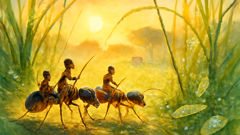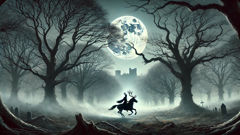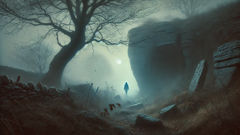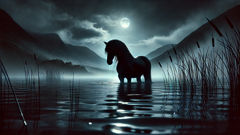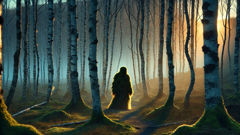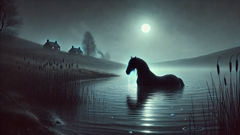Introduction
When the dawn breaks over the South African savanna, the golden rays slip quietly through endless grass, igniting a living tapestry where every blade sways with secrets. Here, between earth and sky, in a place most eyes would pass by, dwelled the Abatwa: a people so small that they vanished beneath a dew-laden leaf and galloped unseen on the backs of ants. While the world bustled with the thunder of wildebeest herds and the chatter of distant villages, the Abatwa thrived in a hidden realm—one where a raindrop could fill a pond and the wind’s gentle sigh could topple a home. Their lives were woven into the roots and rhythms of the land, and though most believed them to be a mere whisper of legend, the Abatwa’s story is far more real than any would guess.
The Abatwa were born from the heart of the earth, or so the old Zulu stories say, when the world was still young and the first grasses rose above the soil. Blessed by uNkulunkulu, the great spirit, they inherited cleverness to match their size and a spirit fierce enough to protect all that grew and crawled beside them. Their world was an intricate labyrinth: towering grass blades that arched like trees, anthills that rose as mountains, and petals wider than a house. It was a kingdom of color and sound, filled with the music of cicadas and the tremble of elephant footsteps that thundered from miles away.
Among the Abatwa, every day was an adventure—finding food beneath a fallen seed, crafting arrows from porcupine quills, or slipping unseen past curious mongoose eyes. But they weren’t mere survivors; they were guardians. With wisdom passed from one generation to the next, the Abatwa watched over the fragile harmony between grass and beast, teaching even the largest creatures that greatness wasn’t a matter of size. To those with eyes to notice, traces of the Abatwa could be found: a perfectly braided blade of grass, a tiny handprint in the mud, or a trail of ants marching with riders astride their backs. For centuries, they kept to the shadows, their stories scattered like seeds in the wind—awaiting those who would listen. This is the tale of how the Abatwa left their mark on the land, a myth as old as the savanna itself, rich with courage, mystery, and the magic of the world’s smallest people.
I. The Hidden Village Beneath the Blades
Few humans ever glimpsed the Abatwa village. It was nestled beneath a clump of red grass, a place where the stems grew thick and tangled, forming a fortress from prowling predators and prying eyes. The village itself was a marvel of ingenuity: houses woven from spider silk and seeds, bridges suspended across droplets, and watchtowers crafted from hollowed reeds. Each home, though no larger than a pebble, was alive with laughter and the scent of wildflowers.
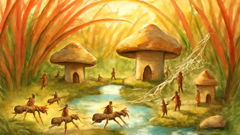
The Abatwa leader was old Sifiso, whose wisdom was said to stretch from root to canopy. Sifiso’s beard, white as the clouds that drifted above, brushed the ground when he walked. His hut, built beneath a mushroom cap, was always busy with visitors. On the first day of the rainy season, Sifiso called the people together. The air shimmered with anticipation as children, barely larger than beetles, clambered onto pebbles to get a better view. “We are the keepers of balance,” Sifiso proclaimed, his voice as soft as a breeze but as steady as the earth. “From the shadow of the lion’s paw to the trembling wings of a butterfly, all creatures share this land. Our strength is our unity and our wit.”
The Abatwa took these words to heart. They worked together, gathering nectar from wildflowers to store in shells, mending their homes with grass fibers, and patrolling the borders on ant-back. Their ant companions, enormous and powerful by Abatwa standards, were more than beasts of burden—they were friends, guardians, and trusted allies. To ride an ant was a privilege earned by courage and respect. The ants would respond to gentle whistles and soft clicks, a language only the Abatwa understood.
One evening, as dusk painted the savanna in indigo and gold, a scout named Nandi returned with troubling news. She had seen the heavy tread of buffalo herds drawing close to the village. The earth trembled under their approach. Sifiso gathered the elders. “We must move before dawn,” he said, “or be crushed beneath hooves.” The villagers sprang into action. Teams of children rode on ants, ferrying supplies and leading the way. Others unraveled their homes and tied them into bundles, ready for transport. It was a dance of precision and care—one they’d performed many times before, for the savanna was ever-changing.
The journey to their new home was fraught with danger. A lone mongoose prowled nearby, its nose twitching at unfamiliar scents. The Abatwa froze, blending into the earth, and waited until the beast wandered away. At sunrise, they found a new patch of tall grass, where dew pooled in the hollows and seeds hung heavy on the stalks. The Abatwa rebuilt their village with practiced hands. Children celebrated by racing their ants in wide circles, laughter echoing among the roots. That night, as stars sprinkled the sky, Sifiso spoke to his people. “We are small,” he said, “but our spirits are as vast as this land.”
The Abatwa lived in rhythm with the seasons, moving as the rains shifted, never taking more than they needed. They left behind no scars, only the soft trace of their passing—proof that harmony with nature was possible, even in a world where giants roamed.
II. The Season of Shadows and the Lion’s Test
When the dry season gripped the land, shadows grew longer and waterholes shrank to muddy patches. The Abatwa faced new perils—not just from thirst and hunger, but from the predators that prowled in search of easy prey. One morning, the ground vibrated with a low rumble, and a shadow blotted out the sun above the Abatwa village. It was Nkosi, the great lion, whose mane glowed like wildfire.
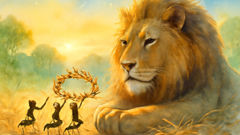
Nkosi was feared by all who walked or crawled across the savanna. His roar sent gazelles flying and monkeys scrambling into the highest trees. Yet, for all his strength, Nkosi was not cruel; he ruled his territory with a sense of pride and fairness. One day, while prowling for water, Nkosi heard the faintest chorus—a song so tiny it could have been the wind. Curious, he lowered his massive head to the ground and saw a line of ants marching, each bearing a miniature rider. The Abatwa were headed to a distant dew pool.
“Who dares pass through my land?” Nkosi thundered. The ants halted at once. Sifiso, riding at the front, looked up into eyes the color of storm clouds. “We are the Abatwa,” he replied, his voice unwavering. “We seek only water and peace.”
Nkosi narrowed his eyes. “You are smaller than seeds. Why should I let you cross my land?” Sifiso answered, “Because even the smallest heart can show the greatest courage.” Amused, Nkosi set them a test. “If you can show me bravery and wisdom, I’ll grant you safe passage—and tell the other beasts to respect your paths.”
That night, Sifiso gathered his bravest scouts—Nandi, Lethu, and Jabu. They crept to Nkosi’s den, where the lion slept, his tail twitching in dreams. At dawn, they left a gift at his paw: a crown woven from golden grass and fragrant herbs. When Nkosi awoke, he found the crown, its scent filling his nose and calming his temper. The gesture spoke louder than words.
Nkosi was moved. “You have shown respect and cunning,” he announced to the savanna. From that day on, the lion watched over the Abatwa, warning others to tread carefully where ants marched and dew sparkled on the grass. The Abatwa, in turn, honored Nkosi every year with songs and garlands, reminding all who heard that wisdom and kindness could tame even the wildest heart.
But the season of shadows had more tests in store. With water scarce, conflict grew among the savanna’s dwellers. The Abatwa brokered peace between rival ant colonies, taught thirsty birds to find hidden springs, and helped young animals learn which plants to avoid. Their acts rippled outward, restoring balance even as the land waited for rain. When the first thunder rolled across the plains, it was said that Nkosi himself roared in thanks, and the Abatwa danced in celebration beneath a sky split by lightning and hope.
III. Whispers of the Wind: The Abatwa’s Greatest Challenge
With each passing season, the Abatwa’s legend grew. Creatures of every shape and size respected their wisdom, and the land flourished under their watchful eyes. But as often happens, peace attracted envy and trouble. Far beyond the savanna, a wandering band of humans—tall as mountains to the Abatwa—began exploring new lands. They were searching for rare roots and wild honey, drawn by tales of hidden riches whispered by traders.
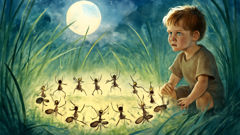
One crisp morning, a boy named Sipho ventured away from his family’s camp. His curiosity led him deep into tall grass where he paused, astonished, to see a tiny figure riding an ant across a pebble. Sipho blinked, certain he must be dreaming. But when he knelt down, he saw an entire world—houses tucked beneath mushrooms, laughter carried on the wind, and lines of ants moving in formation. The Abatwa froze in terror. For them, humans were stories told by elders: unpredictable, clumsy giants who could destroy with a single step.
Sifiso approached Sipho cautiously. He realized that this boy seemed gentle and awed rather than threatening. “We are the Abatwa,” Sifiso said quietly. Sipho listened with wonder as Sifiso explained how their lives intertwined with every leaf and ant, how even the smallest creature had a place in the great web of life. Sipho promised to keep their secret and left behind a gift—a bead from his necklace, bright as sunrise and no larger than an Abatwa’s shield.
But not all humans were so kind. One evening, a group of hunters stumbled near the village. They noticed ants carrying seeds and decided to follow, hoping to find an easy harvest. As they neared the Abatwa’s home, their heavy boots crushed the grass and sent tremors through the earth. The Abatwa sounded an alarm. Children scrambled onto ant backs while elders camouflaged their homes with moss and mud.
As panic spread, Sifiso remembered Sipho’s promise. With great risk, he rode an ant to the boy’s camp as dusk fell. Sipho saw him and quickly understood the danger. Acting swiftly, he convinced his family that wild bees nested in that patch of grass—enough to send even seasoned hunters away in haste. The threat passed, but the lesson lingered: not all giants were foes, but caution was always wise.
In gratitude, Sifiso invited Sipho to a secret celebration beneath the full moon. The boy sat quietly as the Abatwa danced, their footsteps barely stirring the dust, and sang songs about courage and friendship that only hearts attuned to wonder could truly hear. When Sipho returned to his people, he carried with him not just a story but a promise—to walk lightly and listen deeply, for the world was full of unseen miracles.
That year, as rains returned and the savanna bloomed once more, word spread among the animals: the Abatwa’s wisdom had spared them from disaster. Their story became a living legend, whispered on the wind, reminding every creature that in unity and respect lay the true magic of the land.
Conclusion
Time moves differently for those who dwell beneath the grass. While seasons come and go for the great beasts above, the Abatwa measure their days in dewdrops and shadows, leaving only faint traces for those wise or patient enough to see. Their story endures in every whispered breeze, in every ant’s determined march, and in the soft hush that settles over the savanna at dusk. Some say that when you walk gently across the wilds of KwaZulu-Natal and kneel close to the ground, you might catch a glimmer of movement—a flash of color or a chorus of laughter too delicate for most ears. The Abatwa remain guardians of balance and beauty, living proof that strength is not measured by size but by courage, kindness, and harmony with all living things.
So remember: when you pass through fields where the grass sways high and unseen worlds flourish below, step lightly. For beneath your feet may lie the legacy of the Abatwa—a tiny people whose love for their land shaped an entire world and whose story continues to grow, like grass beneath the endless African sky.

